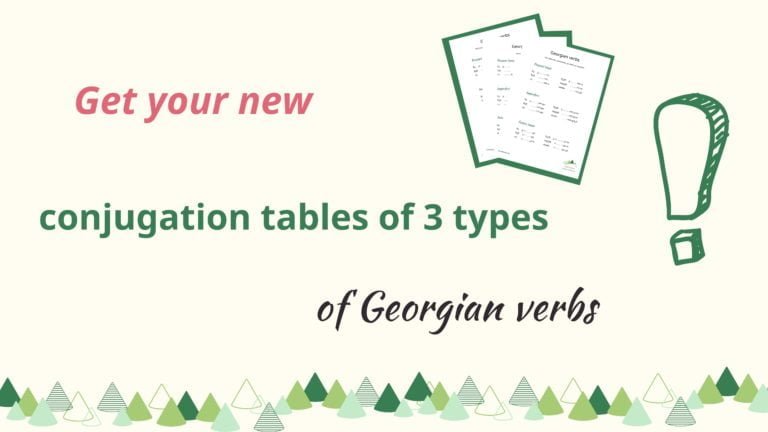If you want to speak Georgian, you have to know this case. It’s the most commonly used case (just after the Nominative). Good news is you’ll learn it from this article.
Here you’ll find the most useful informations: how to use it and when as well as what are the typical endings of the case. But before that let’s start from the short introduction. There are 7 cases in Georgian language. If this is yours first encounter with Georgian cases, more about each of them you’ll find in the Georgian cases introduction article. Additional information is that we decline both, nouns, adjectives, pronouns and numerals.
The Georgian 3rd case is called Dative in English, in Georgian: მიცემითი ბრუნვა.
How to use 3rd case with nouns?
The basic ending typical for the 3rd case is -ს, which is added to the root of the word. What does it mean? In case the word is ended with -ი (which happens in almost 90% of cases), this letter disappears in majority of declinations and word formation situations. This place is being taken by the letter -ს.
In case the word is ended with other vowel, you just add the letter -ს to the unchanged word. There is not really the third option. Similarly, you proceed with adjectives and numerals that stand alone, i.e. are not standing directly next to the noun they describe.
What if there is noun and adjective or numeral?
Here we are talking about situation when there is whole phrase, e.g. big apple or three cars. In this case the noun can be seen as the main part of such a phrase. So we decline it following the above mentioned rules, but adjectives and numerals decline differently. If they are ended with -ი, we cut this letter out and do not add anything instead. If the word ends with other vowel, the nit stays unchanged.
How to decline pronouns in 3rd case in Georgian?
The other part of speech is pronoun. We’ll talk today only about possessive pronouns. Other will be described in the next articles. With the possessive pronouns it’s quite simple. They are all ended with -ი, which disappears in 3rd case. This place is being taken by the letter -ს. This works a bit different for the 3rd person plural and singular. The possessive pronouns are მისი and მათი. We leave the last letter, but do not double the -ს letter.
Below we have gathered all the examples in one table, so you can analyse them on your own.
Nominativ |
Ergativ |
Dativ |
Genitiv |
Instrumental |
Adverbial |
Vocativ | |
Noun | |||||||
| -ი | ფეხი | ფეხს | |||||
| -რ-, -მ-, -ნ-, -ლ- | მატარებელი | მატარებელს | |||||
| -ა, -ე | მანქანა | მანქანას | |||||
| -ო, -უ | მეტრო | მეტროს | |||||
Adjective | |||||||
| -ი | კარგი | კარგს | |||||
| -ა, | პატარა | პატარას | |||||
| -ი | კარგი მანქანა | კარგ მანქანას | |||||
| -ა, -ე, -უ, -ო | პატარა სახლი | პატარა სახლს | |||||
| |||||||
Possessive pronouns | |||||||
| ჩემი | ჩემს | ||||||
| ჩემი სახლი | ჩემს სახლს | ||||||
Personal pronouns | |||||||
| ის | მას | ||||||
| ისინი | მათ | ||||||
When do we use the 3rd case in Georgian language?
So we have just covered the declination part. Now, the time has come for the usage. But when to use it? The main reason the 3rd case is so vital to know in Georgian language is that it’s required by the verb conjugation. Either the subject or the object stays in the 3rd case.
The situation when object stays in 3rd case:
მე პურს ვჭამ. – I eat bread.
შენ პურს ჭამ. – You eat bread
ის პურს ჭამს. – He eats bread.
If you want to ask “What do you eat?”, you have to decline the word რა – „what” in Georgian, so it changes to რას?. Exactly as other words and rules you have just learned.
The situation when the subject is in 3rd case in Georgian language:
მას ირინა ჰქვია. – She is called Irina (Her name is Irina).
In this case ის changes into მას (the 3rd case for of this pronoun).
Are those all the situations when we use Dative?
No! There are many postpositions which connect with the 3rd case as well as phrases in which this case is heavily used. Each of them we’ll cover separately soon.

